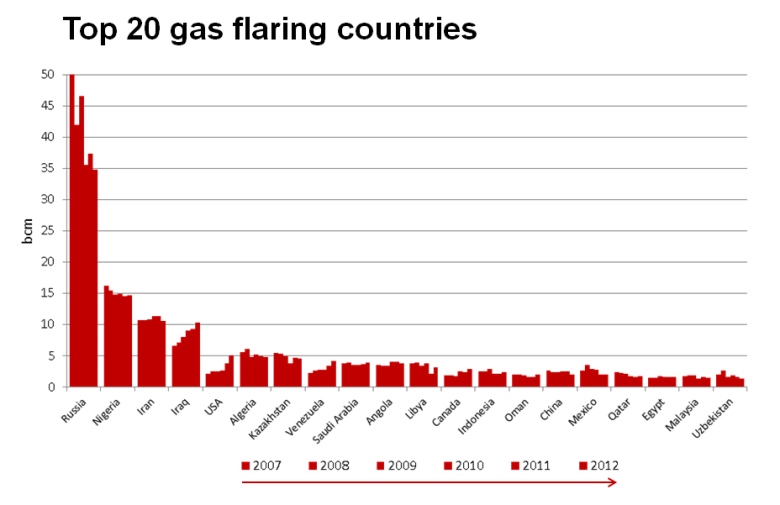There are two oily stories that should catch our attention. One is about designing and fabrication of a refinery at a Nigerian university and the second one is about new dates for ending gas flaring in Nigeria.

First is the news that the Department of Chemical Engineering at the Ahmadu Bello University (ABU), Zaria, has built a mini refinery that can “produce relatively small quantity of petroleum products.” The relatively small quantity this prototype handles is given as one barrel of crude oil per day. This information was shared at a press briefing on the 38th convocation of the university.
Biafra Refined Crude
It would be interesting to place this breakthrough alongside the bush refineries in the Niger Delta that have been in the business of refining crude oil and supplying a variety of products to consumers in the region. We do not have details of the mini-refinery built at ABU. It would be good to know if any engineering departments in our universities have done studies of the bush refineries to see how the technologies adopted in the illegal operations could be adopted, upgraded and used to meet the energy gaps of the nation. So far the engagement with bush refineries has been by the Joint Military Task Force (JTF) and their methodology has been to bomb or burn the refineries.
The fabrication of a mini crude oil refinery at the ABU would be significant or novel if the technology is different from what has been in operation in the world for over 100 years. Just as anyone can ferment fruits (and grains) to obtain alcohol from them, the folks in the creeks and the scientists in then Biafra had the means of refining crude that could be studied and improved on. A commentator writing in Sahara Reporters once said, “The most damning of Nigerian failures for now is the knowledge that while the defunct Biafra Republic could refine fuel some forty years ago the triumphant old country cannot refine enough fuel for its local consumption today. It’s a shame that cries to the high heavens.”
One recollects how, some years ago, a dispute broke out between scientists at a Nigerian university over who among them was the first to extract alcohol from pineapple and some other local fruits. The point is that the entire dispute was nothing more than a bad joke. Hopefully, this news about refining crude is not.
To Flare or Not to Flare
The second item that should raise our antenna is about when the ongoing routine flaring of associated gas would end in Nigeria. For a period of time, successive governments kept shifting the deadline for ending gas flaring from year to year. During the almost one decade of debates on the Petroleum Industry Bill (PIB) nothing was said about when gas flaring would end. A specific bill on gas flaring died without a whimper. The flames roared on while governments stayed mute.
The “new” Petroleum Industry Governance & Institutional Framework Bill (PIG-IFB or PI(GIF)B?) that is in the works is totally silent about when gas flaring would end, and is not concerned with communities or environmental issues. It even makes a passing reference to fracking as one of the things that occurs in the upstream sector of the petroleum industry signifying that the oil industry in Nigeria may be getting set to embark on fracking, an extreme form of extraction. Is the new Bill attempting to sidestep the concerns of suffering communities that the old PIB tried to address and how many PIBs should we expect from the present administration?
Okay, we are now told that gas flaring would end between 2018 and 2020. This was disclosed by the Group General Manager, Nigerian Petroleum Investment and Management Services (NAPIMS), Dafe Sajebor, and the Managing Director of National Petroleum Development Corporation (NPDC), Sadler Mai-Bornu, at a meeting with the Senate panel investigating the activities of oil and gas agencies in the country. A bit of news from the blue!
The World Bank plans to see zero routine gas flaring by 2030 and governments that endorse this initiative are expected to provide legal, regulatory, investment, and operating environment that is conducive to upstream business while ensuring that non-flaring of associated gas is in-built in all production plans. It is curious that the proposed PIG-IFB or PI(GIF)B does not say anything about halting routine gas flaring or even about the penalty for the heinous offence.
Obviously more information needs to be placed in the public realm on how the government plans to achieve zero routine gas flaring by 2018-2020. What plans do oil companies like Chevron, Shell, Total and ExxonMobil have to stop the routine flaring of associated gas in the Niger Delta? The biggest gas flaring company in Nigeria is Chevron. Nigeria and Chevron are not among the 45 countries and companies that endorsed the World Bank plan going by the list on the bank’s website. Neither is climate denier ExxonMobil on that roster. Angola, Cameroon, Republic of Congo and Gabon are the only African countries to have endorsed the plan.
If the big polluters are staying off commitment to end gas flaring even by 2030, what should we say is the basis for oilfield communities to hope that they would soon be able to breath fresh air once again?
By Nnimmo Bassey (Director, Health of Mother Earth Foundation – HOMEF)
